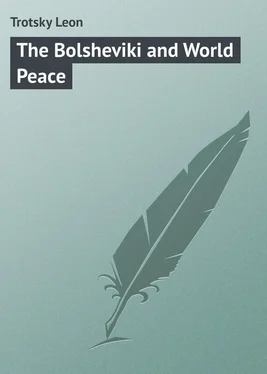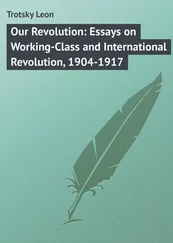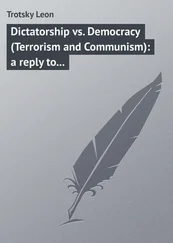Leon Trotsky - The Bolsheviki and World Peace
Здесь есть возможность читать онлайн «Leon Trotsky - The Bolsheviki and World Peace» — ознакомительный отрывок электронной книги совершенно бесплатно, а после прочтения отрывка купить полную версию. В некоторых случаях можно слушать аудио, скачать через торрент в формате fb2 и присутствует краткое содержание. ISBN: , Жанр: foreign_language, Русская классическая проза, на английском языке. Описание произведения, (предисловие) а так же отзывы посетителей доступны на портале библиотеки ЛибКат.
- Название:The Bolsheviki and World Peace
- Автор:
- Жанр:
- Год:неизвестен
- ISBN:http://www.gutenberg.org/ebooks/40273
- Рейтинг книги:4 / 5. Голосов: 1
-
Избранное:Добавить в избранное
- Отзывы:
-
Ваша оценка:
- 80
- 1
- 2
- 3
- 4
- 5
The Bolsheviki and World Peace: краткое содержание, описание и аннотация
Предлагаем к чтению аннотацию, описание, краткое содержание или предисловие (зависит от того, что написал сам автор книги «The Bolsheviki and World Peace»). Если вы не нашли необходимую информацию о книге — напишите в комментариях, мы постараемся отыскать её.
The Bolsheviki and World Peace — читать онлайн ознакомительный отрывок
Ниже представлен текст книги, разбитый по страницам. Система сохранения места последней прочитанной страницы, позволяет с удобством читать онлайн бесплатно книгу «The Bolsheviki and World Peace», без необходимости каждый раз заново искать на чём Вы остановились. Поставьте закладку, и сможете в любой момент перейти на страницу, на которой закончили чтение.
Интервал:
Закладка:
The balance of power in the Balkans, created by the Congress of Berlin in 1879, was full of contradictions. Cut up by artificial ethnographical boundaries, placed under the control of imported dynasties from German nurseries, bound hand and foot by the intrigues of the Great Powers, the peoples of the Balkans could not cease their efforts for further national freedom and unity. The national politics of independent Bulgaria was naturally directed towards Macedonia, populated by Bulgarians. The Berlin Congress had left it under Turkish rule. On the other hand, Servia had practically nothing to look for in Turkey with the exception of the little strip of land, the sandbag Novy Bazar. Its national interests lay on the other side of the Austro-Hungarian boundary, in Bosnia-Herzegovina, Croatia, Slavonia and Dalmatia. Roumania had no interests in the south, where it is separated from European Turkey by Servia and Bulgaria. Roumania's expansion policy was directed towards the northwest and east, towards Hungarian Transylvania and Russian Bessarabia. Finally, the national expansion of Greece, like that of Bulgaria, collided with Turkey.
Austro-German politics, aiming at the artificial preservation of European Turkey, broke down not on account of the diplomatic intrigues of Russia, although these of course were not lacking. It broke down because of the inevitable course of evolution. The Balkan Peninsula had entered on the path of capitalist development, and it was this fact that raised the question of the self-determination of the Balkan peoples as national states to the historical issue of the day.
The Balkan War disposed of European Turkey, and thereby created the conditions necessary for the solution of the Bulgarian and Greek questions. But Servia and Roumania, whose national completion could only be achieved at the expense of Austria-Hungary, found themselves checked in their efforts at expansion southwards, and were compensated at the expense of what racially belonged to Bulgaria-Servia in Macedonia, and Roumania in Dobrudja. This is the meaning of the second Balkan War and the Peace of Bucharest by which it was concluded.
The mere existence of Austria-Hungary, this Turkey of Middle Europe, blocks the way to the natural self-determination of the peoples of the Southeast. It compels them to keep constantly fighting against each other, to seek support against each other from the outside, and so makes them the tool of the political combinations of the Great Powers. It was only in such chaos that Czaristic diplomacy was enabled to spin the web of its Balkan politics, the last thread of which was Constantinople. And only a federation of the Balkan states, both economic and military, can interpose an invincible barrier to the greed of Czarism.
Now that European Turkey has been disposed of, it is Austria-Hungary that stands in the way of a federation of the Balkan states. Roumania, Bulgaria, and Servia would have found their natural boundaries, and would have united with Greece and Turkey, on the basis of common economic interests, into a league of defense. This would finally have brought peace to the Balkan Peninsula, that witches' cauldron which periodically threatened Europe with explosions, until it drew it into the present catastrophe.
Up to a certain time the Socialists had to reconcile themselves to the routine way in which the Balkan question was treated by capitalistic diplomats, who in their conferences and secret agreements stopped up one hole only to open another, even wider one. So long as this dilatory method kept postponing the final solution, the Socialist International could hope that the settlement of the Hapsburg succession would be a matter not for a European war, but for the European Revolution. But now that the War has destroyed the equilibrium of the whole of Europe, and the predatory Powers are seeking to remodel the map of Europe-not on the basis of national democratic principles, but of military strength-the Social Democracy must come to a clear comprehension of the fact that one of the chief obstacles to freedom, peace and progress, in addition to Czarism and German militarism, is the Hapsburg Monarchy as a state organization. The crime of the Galician Socialist group under Daszynski consisted not only in placing the Polish cause above the cause of Socialism, but also in linking the fate of Poland with the fate of the Austro-Hungarian armies and the fate of the Hapsburg Monarchy.
The Socialist proletariat of Europe cannot adopt such a solution of the question. For us the question of united and independent Poland is on a par with the question of united and independent Servia. We cannot and we will not permit the Polish question to be solved by methods which will perpetuate the chaos at present prevailing in Southeastern Europe, in fact through the whole of Europe. For us Socialists the independence of Poland means its independence on both fronts, on the Romanoff front and on the Hapsburg front. We not only wish the Polish people to be free from the oppression of Czarism. We wish also that the fate of the Servian people shall not be dependent upon the Polish nobility in Galicia.
For the present we need not consider what the relations of an independent Poland will be to Bohemia, Hungary and the Balkan Federation. But it is perfectly clear that a complex of medium-sized and small states on the Danube and in the Balkan Peninsula will constitute a far more effective bar to the Czaristic designs on Europe than the weak, chaotic Austro-Hungarian State, which proves its right to existence only by its continued attempts upon the peace of Europe.
In the article of 1853, quoted above, Marx wrote as follows on the Eastern question:
"We have seen that the statesmen of Europe, in their obdurate stupidity, petrified routine, and hereditary intellectual indolence, recoil from every attempt at answering the question of what is to become of Turkey in Europe. The driving force that favors Russia's advance towards Constantinople is the very means by which it is thought to keep her away from it, the empty theory, never carried out, of maintaining the status quo . What is this status quo ? For the Christian subjects of the Porte it means nothing else than the perpetuation of their oppression by Turkey. As long as they are under the yoke of the Turkish rule, they look upon the head of the Greek Church, the ruler of 60 million Greek Church Christians, as their natural protector and liberator ."
What is here said of Turkey now applies in a still greater degree to Austria-Hungary. The solution of the Balkan question is unthinkable without the solution of the Austro-Hungarian question, as they are both comprised in one and the same formula-the Democratic Federation of the Danube and Balkan Nations.
"The governments with their old-fashioned diplomacy," wrote Marx, "will never solve the difficulty. Like the solution of so many other problems, the Turkish problem, too, is reserved for the European Revolution." This statement holds just as good to-day as when it was first written. But for the Revolution to solve the difficulties that have piled up in the course of centuries, the proletariat must have its own programme for the solution of the Austro-Hungarian question. And this programme it must oppose just as strenuously to the Czaristic greed of conquest as to the cowardly and conservative efforts to maintain the Austro-Hungarian status quo .
CHAPTER II
AUSTRIA-HUNGARY
Russian Czarism undoubtedly represents a cruder and more barbarian form of state organization than does the feebler absolutism of Austria-Hungary, which has been mitigated by the weakness of old age. But Russian Czarism and the Russian state are by no means identical. The destruction of Czarism does not mean the disintegration of the state. On the contrary it means its liberation and its strengthening. All such assertions, as that it is necessary to push Russia back into Asia, which found an echo even in certain Social Democratic organs, are based on a poor knowledge of geography and ethnography. Whatever may be the fate of various parts of present Russia-Russian Poland, Finland, the Ukraine or Bessarabia-European Russia will not cease to exist as the national territory of a many-millioned race that has made notable conquests along the line of cultural development during the last quarter century.
Читать дальшеИнтервал:
Закладка:
Похожие книги на «The Bolsheviki and World Peace»
Представляем Вашему вниманию похожие книги на «The Bolsheviki and World Peace» списком для выбора. Мы отобрали схожую по названию и смыслу литературу в надежде предоставить читателям больше вариантов отыскать новые, интересные, ещё непрочитанные произведения.
Обсуждение, отзывы о книге «The Bolsheviki and World Peace» и просто собственные мнения читателей. Оставьте ваши комментарии, напишите, что Вы думаете о произведении, его смысле или главных героях. Укажите что конкретно понравилось, а что нет, и почему Вы так считаете.











